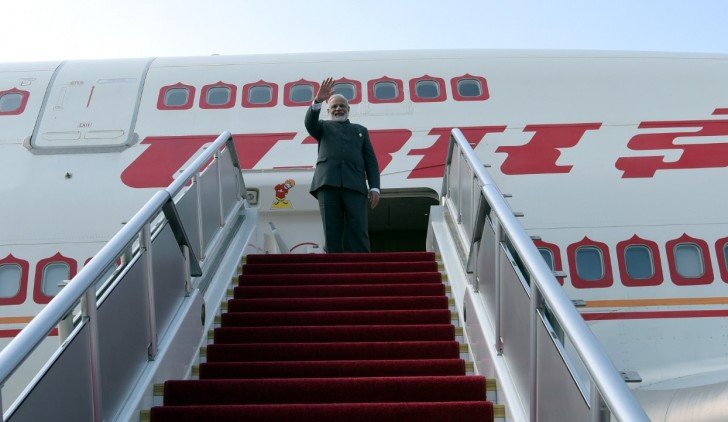Modi in Myanmar amid Rohingya crisis

Nay Pyi Taw, Sep 5
Indian Prime Minister Narendra Modi arrived here on Tuesday on a three-day visit to Myanmar amid a raging crisis involving Rohingyas in the country's Rakhine state.
Soon after his arrival here, he called on Myanmar President U Htin Kyaw at whose invitation he has come. Prior to the meeting, the visiting dignitary was presented a guard of honour on the Presidential Palace grounds.
"PM @narendramodi welcomed by the President U Htin Kyaw; both leaders inspect the guard of honour," External Affairs Ministry spokesperson Raveesh Kumar tweeted.
This is Modi's first bilateral visit to India's eastern neighbour. He had come here in 2014 to attend the Association of Southeast Asian Nations (Asean)-India Summit.
On Wednesday, the Prime Minister will hold bilateral discussions with Myanmar's State Counsellor Aung San Suu Kyi, who is also the country's Foreign Minister and Minister of President's Office. Following the discussions, a number of agreements are expected to be signed.
Suu Kyi is under mounting international pressure to stop the alleged human rights violations against the Rohingyas, who are denied citizenship in Myanmar.
Thousands of Rohingyas are crossing over into Bangladesh -- where they are sparingly given refugee status -- to escape from the violence in Rakhine state. Media reports quoted the UNHCR spokesperson in Bangladesh as saying that at least 123,000 Rohingyas have crossed over.
The latest exodus began on August 25, after Rohingya insurgents attacked police posts in Rakhine leading to a violent offensive by the Myanmar Army.
Meanwhile, India has said that it would deport all Rohingyas living in the country illegally but the country's Supreme Court has said that it will hear on September 11 a plea seeking a direction to the central government not to deport about 40,000 Rohingya Muslim refugees back to Myanmar.
This apart, India's capacity building measures and infrastructure development projects are expected to come up for discussion during the Modi-Suu Kyi meeting.
India has committed grant-in-aid assistance amounting to Rs 4,000 crore to Myanmar, out of a total commitment of around $1.7 billion.
The projects include the Kaladan Multimodal Transport Project connecting Sittwe port in Myanmar with the northeast Indian state of Mizoram, a trilateral highway connecting northeastern India with Myanmar and Thailand, and the Rhi-Tiddim road.
In terms of capacity building, New Delhi is assisting the eastern neighbour in setting up institutions of higher learning like the Myanmar Institute of Information Technology, Advanced Centre for Agricultural Research and Education, Myanmar-India Entrepreneurship Development Centre, Myanmar-India Centre for English Language Training and India-Myanmar Industrial Training Centres.
India has also provided humanitarian relief following natural calamities like Cyclone Mora this year, Komen in 2015 and Nargis in 2008 and an earthquake in Shan state in 2010.
In a media briefing in New Delhi ahead of Modi's visit to Myanmar, Sripriya Ranganathan, Joint Secretary (Bangladesh and Myanmar) in the Indian External Affairs Ministry, said both sides would take stock of the ongoing infrastructure projects and also discuss the kind of projects which the new Myanmarese government has on its priority list and which they would like to partner India with in the process of execution.
"We will be guided by the government of Myanmar in terms of the choice of projects," Ranganthan said.
"The stated priorities of this government are infrastructure, power and energy and we believe these could be the areas where there is a great deal that Indian agencies can bring to the table."
With both countries sharing a 1,600-km-long boundary, the issue of security cooperation is also expected to come up for discussion.
During his stay in Myanmar, Prime Minister Modi will also visit Bagan, a heritage city where the Archaeological Survey of India is involved in restoration work of a temple and some pagodas, and Yangon where he will interact with members of the Indian community.
Modi arrived here from Xiamen, China, where he attended the 9th BRICS Summit from September 3-5.
Rohingyas illegal migrants, need to go: Rijiju
Minister of State for Home Affairs Kiren Rijiju on Tuesday defended the government's decision to deport Rohingyas, saying they were illegal migrants who did not have same rights as any ordinary Indian.
He said that international organisations and human rights bodies were unfairly accusing the government of being harsh towards the Rohingyas.
"Let me make it very clear. Rohingyas are illegal migrants and not Indian citizens... So they are not entitled to anything that any ordinary Indian citizen is entitled to," Rijiju told a press conference.
He said his statement in the Parliament regarding deportation of Rohingyas was based "completely on a legal position".
"They are illegal migrants and as per law, they stand to be deported. So we have instructed all state governments to constitute task force to identify Rohingyas and start the process of deporting them.
"It's a completely legal process," Rijiju said.
However, he added, India is a nation with democratic tradition.
"We are not going to throw them in the middle of the ocean or going to shoot them. Why are we being accused of being very inhuman," he asked adding that international human rights organisations were unnecessarily targeting the central government.
"India has absorbed maximum number of refugees in the world. So no one should teach India the lesson on how to deal with refugees," he said.
Rijiju had earlier told Parliament that the central government had directed state authorities to identify and deport illegal immigrants, including Rohingyas.

